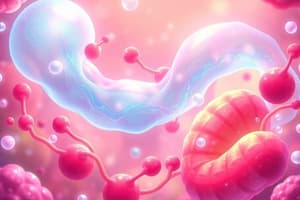Podcast
Questions and Answers
What is the function of carbohydrates in living organisms?
What is the function of carbohydrates in living organisms?
- Storing genetic information
- Facilitating communication between cells
- Supplying energy through cellular respiration (correct)
- Forming structural components in muscle fibers
Which molecule functions as storage materials, insulators, signaling agents, and components of cell membranes?
Which molecule functions as storage materials, insulators, signaling agents, and components of cell membranes?
- Nucleic acids
- Carbohydrates
- Lipids (correct)
- Proteins
What determines the unique shape of proteins?
What determines the unique shape of proteins?
- Tertiary structure (correct)
- Primary structure
- Secondary structure
- Quaternary structure
Which of the following molecules can exist as simple sugars like glucose or more intricate compounds like glycogen?
Which of the following molecules can exist as simple sugars like glucose or more intricate compounds like glycogen?
What are the fundamental building blocks of all living organisms?
What are the fundamental building blocks of all living organisms?
How do proteins contribute to living organisms?
How do proteins contribute to living organisms?
What is the primary function of DNA in living systems?
What is the primary function of DNA in living systems?
Which process involves converting organic matter (food) into smaller molecules while releasing energy?
Which process involves converting organic matter (food) into smaller molecules while releasing energy?
What is the primary currency of cellular energy transfer?
What is the primary currency of cellular energy transfer?
Which biochemical pathway breaks down one molecule of glucose into pyruvate and generates ATP?
Which biochemical pathway breaks down one molecule of glucose into pyruvate and generates ATP?
What is the main role of vitamins and minerals in biochemical reactions within organisms?
What is the main role of vitamins and minerals in biochemical reactions within organisms?
Which biochemical process involves producing glucose from carbon dioxide and water using light energy?
Which biochemical process involves producing glucose from carbon dioxide and water using light energy?
Study Notes
Unlocking Life's Building Blocks: A Journey Through Biochemistry
Biochemistry is a field of chemistry focused on understanding life's chemical processes, from molecular interactions within cells to complex metabolic pathways. In this exploratory journey, we'll delve into some key concepts underpinning our biological world, revealing how chemistry contributes to life itself.
Molecules Powering Life
At the heart of all living organisms lie molecules such as proteins, carbohydrates, lipids, nucleic acids, and vitamins. These fundamental building blocks perform vital functions like providing structure to cells, storing energy, carrying genetic information, and facilitating communication between them.
Proteins, for instance, serve many roles—from catalyzing reactions in enzymes to forming structural components in muscle fibers. Their unique shape results from folding patterns dictated by their primary, secondary, tertiary, and quaternary structures.
Carbohydrates, on the other hand, supply our bodies with energy through cellular respiration, while also playing crucial roles in immune responses. They can exist as simple sugars (monosaccharides) like glucose or more intricate compounds containing multiple sugar units (polysaccharides) like glycogen.
Lipids function chiefly as storage materials, insulators, signaling agents, and components of cell membranes. Phospholipids, cholesterols, triglycerides, and steroids represent just some types of these hydrophobic yet versatile molecules.
Nucleic acids store, replicate, and transmit genetic instructions to living systems. DNA (deoxyribonucleic acid) carries essential blueprints encoding biological data, whereas RNA (ribonucleic acid) acts both as messengers ferrying coded messages from DNA to protein synthesizing machinery and as functional entities themselves in certain cases.
Vitamins and minerals play indispensable roles acting as cofactors, stabilizers, and regulators in countless biochemical reactions without which organisms would fail to thrive.
Energy Flow: Metabolism
Life relies upon transforming food into usable energy via biochemical pathways known collectively as metabolism. This process involves two main categories: catabolism converts organic matter (food) into smaller molecules, releasing energy; anabolism utilizes those broken down molecules to build larger ones, consuming energy in the process.
Pivotal biochemical reactions associated with metabolic processes include glycolysis, oxidative phosphorylation, citric acid cycle (TCA cycle), and photosynthesis. Glycolysis breaks down one molecule of glucose into pyruvate generating ATP (adenosine triphosphate) – the primary currency of cellular energy transfer – while producing NADH (nicotinamide adenine dinucleotide) and FADH2 (flavin adenine dinucleotide), electron donating molecules used during oxidative phosphorylation.
Oxidative phosphorylation occurs when electrons derived from NADH and FADH2 flow through a series of redox reactions involving enzyme complexes embedded in mitochondrial inner membrane, ultimately generating ATP.
The TCA cycle sustains cellular energy generation by recycling intermediates produced during glycolysis, amino acid degradation, and fatty acid breakdown, yielding additional NADH and FADH2. Photosynthesis, conversely, produces glucose from carbon dioxide and water utilizing light energy absorbed by pigments like chlorophyll.
This basic overview only scratches the surface of the vast, fascinating realm of biochemistry. Living organisms continue to surprise scientists with novel discoveries, rendering it a continually evolving field where new insights consistently challenge previous assumptions. Delving deeper uncovers further mysteries and wonders awaiting exploration—a testament to the enduring complexity and beauty of life's molecular mechanisms.
Studying That Suits You
Use AI to generate personalized quizzes and flashcards to suit your learning preferences.
Description
Embark on a journey through biochemistry to uncover the fundamental building blocks of life, including proteins, carbohydrates, lipids, nucleic acids, and vitamins. Learn about key concepts like metabolism, glycolysis, oxidative phosphorylation, and the TCA cycle, which underpin the energy flow in living organisms.



